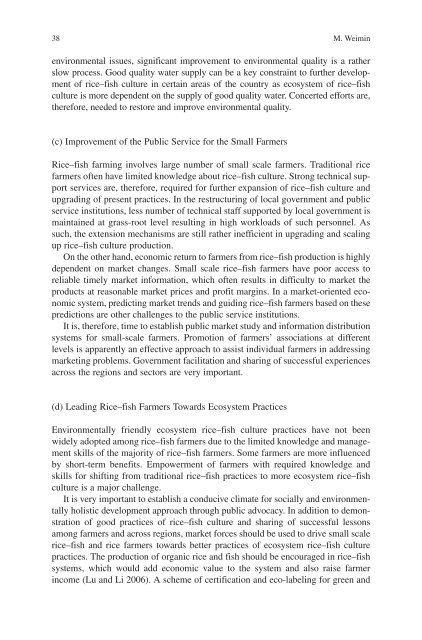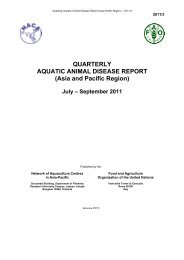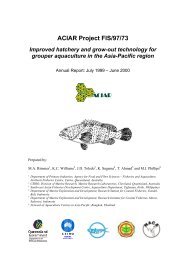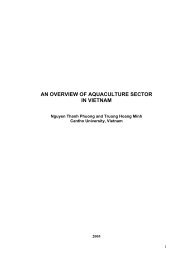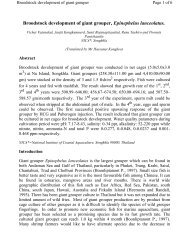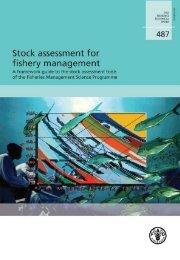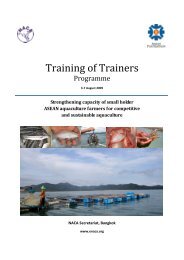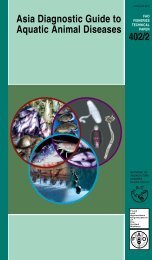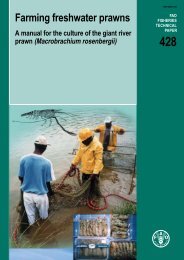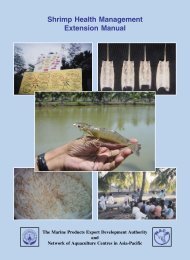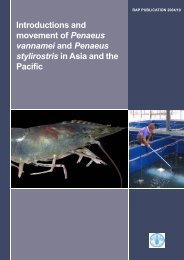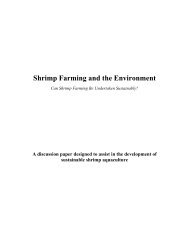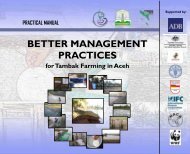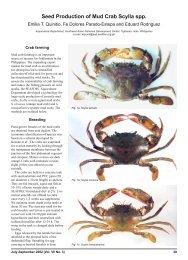Success Stories In Asian Aquaculture - Library - Network of ...
Success Stories In Asian Aquaculture - Library - Network of ...
Success Stories In Asian Aquaculture - Library - Network of ...
- No tags were found...
You also want an ePaper? Increase the reach of your titles
YUMPU automatically turns print PDFs into web optimized ePapers that Google loves.
38 M. Weiminenvironmental issues, significant improvement to environmental quality is a ratherslow process. Good quality water supply can be a key constraint to further development<strong>of</strong> rice–fish culture in certain areas <strong>of</strong> the country as ecosystem <strong>of</strong> rice–fishculture is more dependent on the supply <strong>of</strong> good quality water. Concerted efforts are,therefore, needed to restore and improve environmental quality.(c) Improvement <strong>of</strong> the Public Service for the Small FarmersRice–fish farming involves large number <strong>of</strong> small scale farmers. Traditional ricefarmers <strong>of</strong>ten have limited knowledge about rice–fish culture. Strong technical supportservices are, therefore, required for further expansion <strong>of</strong> rice–fish culture andupgrading <strong>of</strong> present practices. <strong>In</strong> the restructuring <strong>of</strong> local government and publicservice institutions, less number <strong>of</strong> technical staff supported by local government ismaintained at grass-root level resulting in high workloads <strong>of</strong> such personnel. Assuch, the extension mechanisms are still rather inefficient in upgrading and scalingup rice–fish culture production.On the other hand, economic return to farmers from rice–fish production is highlydependent on market changes. Small scale rice–fish farmers have poor access toreliable timely market information, which <strong>of</strong>ten results in difficulty to market theproducts at reasonable market prices and pr<strong>of</strong>it margins. <strong>In</strong> a market-oriented economicsystem, predicting market trends and guiding rice–fish farmers based on thesepredictions are other challenges to the public service institutions.It is, therefore, time to establish public market study and information distributionsystems for small-scale farmers. Promotion <strong>of</strong> farmers’ associations at differentlevels is apparently an effective approach to assist individual farmers in addressingmarketing problems. Government facilitation and sharing <strong>of</strong> successful experiencesacross the regions and sectors are very important.(d) Leading Rice–fish Farmers Towards Ecosystem PracticesEnvironmentally friendly ecosystem rice–fish culture practices have not beenwidely adopted among rice–fish farmers due to the limited knowledge and managementskills <strong>of</strong> the majority <strong>of</strong> rice–fish farmers. Some farmers are more influencedby short-term benefits. Empowerment <strong>of</strong> farmers with required knowledge andskills for shifting from traditional rice–fish practices to more ecosystem rice–fishculture is a major challenge.It is very important to establish a conducive climate for socially and environmentallyholistic development approach through public advocacy. <strong>In</strong> addition to demonstration<strong>of</strong> good practices <strong>of</strong> rice–fish culture and sharing <strong>of</strong> successful lessonsamong farmers and across regions, market forces should be used to drive small scalerice–fish and rice farmers towards better practices <strong>of</strong> ecosystem rice–fish culturepractices. The production <strong>of</strong> organic rice and fish should be encouraged in rice–fishsystems, which would add economic value to the system and also raise farmerincome (Lu and Li 2006) . A scheme <strong>of</strong> certification and eco-labeling for green and


